-
The Federal Housing Administration's efforts to shift the burden of supervising mortgage brokers to lenders is creating a mini-boom in demand for brokers to bring in homebuyers and refinancing customers.
July 12 -
With home mortgage volume falling sharply in recent years, it might seem as though recruitment should be the last thing on lenders' minds. But surprisingly, one of lenders' biggest challenges these days is finding a few good men and women to join the sales force.
June 4 -
New rules that govern how nonbank loan officers conduct their affairs and train their staff are rolling through the nation and the grumbling is getting louder. Some LOs are begrudgingly complying while others are thinking of jumping ship to a depository.
May 19
Many nonbank mortgage lenders are likely to be hamstrung after Saturday, the deadline for their loan officers to obtain state licenses under new minimum national standards.
Firms around the country are scrambling to turn in license applications. A handful of state regulators have tried to accommodate the industry by extending the deadline in their jurisdictions. Close to 35% of originators failed the national written test and nearly a quarter flunked the relevant state tests in the 12 months that ended June 30.
As loan officers who don't meet the requirements drop out of the industry, the result could be a shortage of people to take applications — at a time when demand for refinancings is historically high. The processing bottlenecks at nonbanks would drive more market share to the largest banks, whose loan officers are exempt from state licensing and education requirements.
"It is the hardest set of gymnastics that I have ever had to jump through," said Anthony Hsieh, the founder and chief executive of loanDepot.com, an Irvine, Calif., online lender. "Not only is there chaos on the competitive front, but confusion about the work force."
Deborah Robertson, a lawyer with McGlinchey Stafford PLLC, said some states are not ready to give the tests, and others, like New York, do not have enough space for all the applicants to take the tests.
"Many of the states aren't ready, so they are giving some sort of conditional approval," Robertson said. "Otherwise, people would lose their livelihoods. It means folks will not get approvals for some time."
On Monday, Thomas Considine, New Jersey's banking commissioner, extended the state's deadline from July 31 to Oct. 31. South Carolina has done the same. In both states applicants with pre-existing licenses who have turned in their paperwork can continue to originate loans while their applications for new licenses are being processed.
In a nine-page order, Considine said that maintaining the continuity of residential mortgage lenders, bankers and brokers "is essential to the economy of New Jersey." But he also admonished originators for filing incomplete applications, saying the state would not give them "conditional" licenses.
Though July 31 is the deadline for most states, five states — Florida, Hawaii, Maine, Minnesota and Nevada — have deadlines of Dec. 31. Florida has acknowledged that the sheer volume of applications will take longer than two to four months to process and said it may take up to a year.
The Department of Housing and Urban Development sets the minimum national standards, under the Secure and Fair Enforcement for Mortgage Licensing Act of 2008. But the financial reform law that President Obama signed last week will eventually transfer the standard-setting function to the forthcoming Consumer Financial Protection Bureau at the Federal Reserve.
HUD has said it may extend a state's deadline if the state has made a good-faith effort to meet the SAFE Act requirements.
A few states, including California and Utah, have two separate agencies with different deadlines. California's Department of Corporations has been sending e-mails telling loan officers and mortgage bankers that they will have to cease operating July 31 until their licenses are reviewed and approved. The California Department of Real Estate's deadline for mortgage brokers and real estate agents is Dec. 31.
"Some loan officers and brokers that do not have their license in hand will be shut out," said Glen Corso, managing director of the Community Mortgage Banking Project, a trade group.
Bill Matthews, the president of State Regulatory Registry LLC — an affiliate of the Conference of State Bank Supervisors that operates the Nationwide Mortgage Licensing System used by the states — said each state has its own administrative process for handling those who are not in compliance.
For example, Kentucky has issued cease-and-desist orders to nonbank lenders that have not complied.
Beyond the immediacy of passing tests is a growing concern that mortgage brokers in particular, who were singled out as a primary factor in the subprime lending crisis because they often steered customers to expensive products with higher fees, will have their ranks cut dramatically. Brokers have long been a low-cost alternative to expensive retail operations.
Last year, only 50% of mortgage companies and 46% of mortgage originators in 27 states had signed up to be on the mandatory system, according to the licensing system's annual report.
In the 12 months through June, 54,201 originators, or 71%, passed the national test on their first try, while 66,164, or 80%, passed state tests the first time around, Matthews said.
The problems are especially acute for lenders whose salespeople work in call centers, taking applications from customers around the country through the Web or phone.
Because of the expense of licensing in so many states, some lenders could pull back and concentrate on lending in just a few states or a specific region, said Taylor Woods, the president of Genpact Mortgage Services, a unit of Genpact Ltd., a New York company that provides outsourced services to a range of industries.
Woods estimated that licensing one individual mortgage banker in all 50 states would cost $15,000 and would take at least a year to take 50 separate state tests.
"The cost of a national license is now very real," Woods said. "Over the last year, lenders have had to decide how big their footprint should be, because you would never pursue a license in all 50 states."
Since it will take every nonbank lender three to five months to get their loan officers licensed, there could be fewer originators to keep up with demand.
"It takes thousands of dollars to get someone licensed in six to 10 states, and that becomes a cost of operations and increases the overall cost structure compared to banks, which can't be good for competition," Hsieh said. "When that happens, lenders will raise rates to slow down demand."
The national test requires 20 hours of education but each state has its own education requirements ranging from Utah (40 hours) to Florida (24 hours). Some lenders said taking multiple state tests was redundant.
"You find the questions on the state level repeated for every state, so you're taking a test that feels like the last test you took a week before," Woods said.
Some lenders that have completed the process say the higher costs of licensing for mortgage bankers and brokers will further disadvantage them in competing with federally chartered institutions. Loan officers who work for federally chartered banks still have to register with the NMLand go through a criminal background check that includes fingerprinting.
The idea for national and state licensing came from Gavin Gee, director of finance for Idaho, after he found that brokers' market share soared to 68% nationally in 2004. Now the broker share has been reversed, with the largest banks controlling 70% of all mortgage originations.
Gee said he wanted to bring the same type of standards that exist in the securities industry to mortgage lending.
By automating the process and assigning a unique identifier to each mortgage loan officer, regulators now can "share information about the bad actors in the industry so they can't move from firm to firm and state to state, undetected," Gee said.





